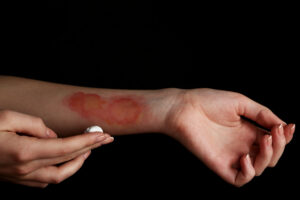Have you been scalded or burned in an accident and are now wondering whether you can sue for a scald injury? If so, our guide could help.
Our guide aims to cover the information you need to know about making a personal injury claim. For example, we will explore the eligibility criteria for holding a valid claim as well as the evidence you could collect to support your case.
Additionally, we will explore what a scald injury is and how one could be sustained.
However, if you still have questions after reading this guide, you can call our team. Our advisors are available to provide free legal advice 24/7. To get in touch:
- Call us on 0800 408 7827
- Contact us with our online form.
- Interact with an advisor via the live chat feature.
About Suing For A Scald Injury
- Can I Sue For A Scald Injury?
- What Scalds And Burns Could I Claim Compensation For?
- What Evidence Do I Need To Sue For A Scald Injury?
- Compensation Payout Examples For A Scald Injury
- How To Sue For A Scald Injury With A No Win No Fee Solicitor
- Get Free Legal Advice And Make A Claim
Can I Sue For A Scald Injury?
Although scald or burn injuries cause similar symptoms, they are caused by different things. According to the NHS, dry heats, such as an open flame, can cause a burn. Whereas hot water or steam can cause a scald.
Symptoms could include:
- Red or peeling skin.
- Blisters.
- Swelling.
- White or charred skin.
Burns can lead to serious and long-lasting consequences. For example, permanent scarring and infection. If you’ve suffered from a burn at work, in a public place or anywhere else that wasn’t your fault, you might be able to make a personal injury claim.
To make a successful claim for a scald or burn, you must prove that someone else breached the duty of care they owed you causing you to sustain harm. This is defined as negligence. We will explore what duty of care means later in this guide.
For further information on how to sue for a scald injury, you can speak with a member of our team.
What Scalds And Burns Could I Claim Compensation For?
There are many types of burns you could have experienced and many scenarios in which you can sue for a scald injury.
Employers must adhere to a piece of legislation called the Health and Safety at Work etc. Act 1974 (HASAWA). It states that they owe employees a duty of care whilst in the workplace. As part of their duty of care, your employer must do all they reasonably can to prevent employees from sustaining harm in the workplace.
Additionally, the person in control of a public space must adhere to the Occupiers’ Liability Act 1957. It’s a piece of legislation that states that the person in control of a public space must do all they reasonably can to ensure that it is safe for the intended use. This could be your local council, for example.
If a third party failed to uphold their duty of care, you could suffer a scald or burn in an injury. For example, your employer may not provide the appropriate protective equipment at your lab job where you handle dangerous chemicals. As a result, you could sustain a chemical burn.
Alternatively, your waiter may spill a hot coffee over you due to bringing over a tray that was overfilled. As a result, you could experience a scald from hot water in a restaurant.
Get in touch for more information on suing for a personal injury.
What Evidence Do I Need To Sue For A Scald Injury?
When you sue for a scald injury, you should provide relevant evidence to support your claim, such as:
- CCTV footage.
- Pictures of the accident and the cause of the accident where possible.
- Witness contact details.
- Records of the accident in an accident report book.
- Medical records containing details about your injury and treatments.
For more information on evidence you could provide in support of your claim, get in touch.
Compensation Payout Examples For A Scald Injury
The compensation table below contains guideline compensation brackets from the Judicial College Guidelines (JCG). Solicitors often use this to help them value the general damages head of claim. General damages seek to provide compensation for the physical and mental pain and suffering you have suffered due to your injury. This is one of the heads of claim that could be included in your settlement.
Compensation amounts can vary depending on your specific circumstances, so you should use these figures as a guide only.
| Injury | Severity | Guideline Compensation Amounts |
|---|---|---|
| Most Serious Cases | Multiple Significant Injuries and Significant Financial Losses | Up to £250,000 plus |
| Facial Disfigurement | (a) Very Severe - A severe psychological reaction and a very disfiguring cosmetic effect | £36,340 to £118,790 |
| Facial Disfigurement | (b) Less Severe - Substantial facial disfigurement and psychological harm | £30,090 to £36,340 |
| Facial Disfigurement | (c) Significant - Plastic surgery will have helped with the worst of the disfigurement. Scarring may visible form a distance | £11,120 to £36,720 |
| Facial Disfigurement | (d) Less Significant - Could be one significant scar or multiple smaller scars | £4,820 to £16,770 |
| Facial Disfigurement | (e) Trivial - There is only a small effect | £2,080 to £4,310 |
| Scarring to Other Parts of the Body | Significant burns covering 40% or more of the body | Likely to exceed £127,930 |
| Scarring to Other Parts of the Body | Number of Noticeable Laceration Scars or One Disfiguring Scar | £9,560 to £27,740 |
| Scarring to Other Parts of the Body | An exploratory has been performed but there was no significant internal injury, award is impacted by the inevitable scar | In the region of £10,550 |
| Scarring to Other Parts of the Body | A single noticeable scar or lots of superficial scar affecting the limbs | £2,890 to £9,560 |
Additionally, you may receive special damages within your settlement. These seek to compensate you for the financial losses you have suffered and will suffer in the future as a result of your injury. This can include medical expenses, care costs and loss of earnings. Providing evidence of these losses, such as bank statements or invoices, could help you in your claim.
Contact us for more information on the compensation you could claim if you’re eligible to sue for a scald injury.
How To Sue For A Scald Injury With A No Win No Fee Solicitor
You could access the services of your solicitor under a type of No Win No Fee arrangement. There are many types including a Conditional Fee Agreement (CFA).
Under a CFA, you won’t pay for a solicitor’s services if your claim fails. However, if your case succeeds, you’ll pay your solicitor a percentage of your compensation, called a success fee. The amount is capped by law.
For more information on how to sue for a scald injury with help from a No Win No Fee solicitor, speak to us today.
Get Free Legal Advice And Make A Claim
We understand that making a claim can be overwhelming. However, our panel of experienced solicitors can support you while suing for a scald injury. They are specialists in personal injury claims and may help you by:
- Walking you through the scald injury claims process and explaining what steps you need to take in a clear manner
- Explaining the meaning of key terminology and legal documents
- Helping you obtain evidence and using this to build your case
- Contacting third parties and negotiating settlements on your behalf
We also understand that you may be concerned about the cost of legal representation. However, you may face no worries when claiming with our panel of solicitors as they operate on a No Win No Fee basis. This means that you may be able to sign a Conditional Fee Agreement (CFA) with them to ensure you pay no fees for their work on your claim. Here are the benefits of signing a CFA:
- If your claim is successful, you must pay our panel of solicitors for their work. However, this will be taken as a small, legally capped percentage of your compensation, known as a success fee.
- If your claim is unsuccessful, you will not be required to pay for the work our panel of solicitors completed on your claim.
Contact our advisors to start your claim today or learn how to sue for a scald injury.
To get in touch:
- Call us on 0800 408 7827
- Contact us with our online form.
- Interact with an advisor via the live chat feature.
Other Resources
For more articles about personal injury claims:
- How to sue a doctor for compensation
- How to sue a takeaway
- How to sue your employer for a broken thumb at work
More information can be found at:
- Health and Safety Executive – First Aid in work
- Royal Society for the Prevention of Accidents – Our vision and mission
- NHS – First Aid
For more guidance about how to sue for a scald injury, speak with us today.
Writer ROB
Editor MIT


